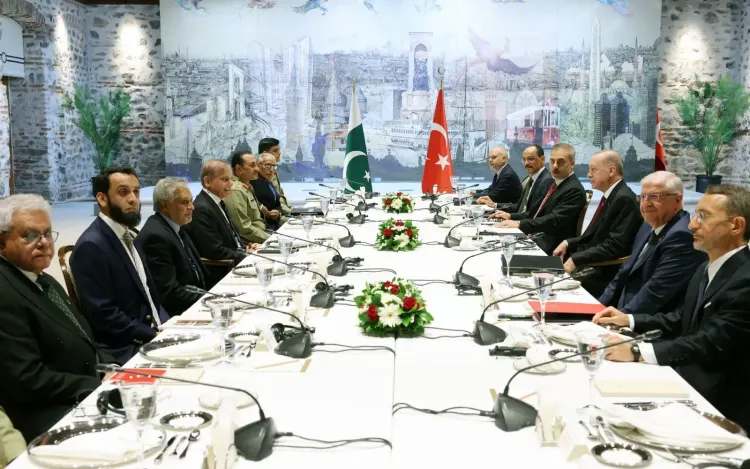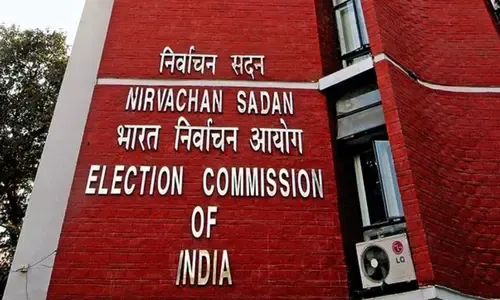Could Ignoring Pakistan and Turkey's Islamist Agenda Cost the US Dearly?

Synopsis
Key Takeaways
- South Asia is facing a strategic crisis due to Islamist influences.
- Pakistan's ISI and Turkey's networks are expanding in Bangladesh.
- U.S. distractions may exacerbate regional threats.
- Strengthening partnerships is crucial for national security.
- Disinformation campaigns are targeting public perception of state institutions.
Dhaka: South Asia is rapidly approaching a significant strategic divide. The region is engulfed in a growing network of Islamist influence supported by both state and non-state entities, while Washington's lack of focus risks escalating local threats into global crises. Instead of tackling the surreptitious maneuvers of Pakistan's Inter-Service Intelligence (ISI) and Turkey's Islamist networks in Bangladesh, the U.S. seems distracted at a crucial moment when assertive leadership is desperately needed. This negligence not only jeopardizes the security of India and its surrounding nations but also leaves U.S. interests vulnerable to repercussions from militancy driven by proxies that can extend across borders and oceans.
Several factors—particularly Pakistan's ISI and Islamist networks associated with Turkey—have been progressively increasing their presence in Bangladesh since the jihadist coup last year. Rather than confronting these alarming trends, President Donald Trump seems more focused on public relations and lucrative business opportunities, including reported crypto and rare-earth dealings involving Pakistan.
A perilous precedent is already set. Decades ago, the ISI acted as Washington's de facto ally in the effort to expel Soviet forces from Afghanistan, a campaign that resulted in billions of U.S. and Saudi funding flowing to Islamist factions. Islamabad leveraged that trust and funding to advance its own strategic goals and develop militant networks, some of which subsequently posed threats to the U.S., Europe, Saudi Arabia, and beyond. The takeaway is evident: short-term tactical partnerships with unaccountable intelligence services can lead to long-lasting strategic disasters.
Reports indicate that Turkish intelligence is allegedly backing Islamist groups in Bangladesh, notably the radical organization Jamaat-e-Islami. If verified, this support would intensify India's security anxieties and complicate the overall regional balance.
Alarmingly, the leadership of Jamaat-e-Islami has issued ominous statements targeting India. Dr. Syed Abdullah Mohammad Taher, Nayeb-e-Ameer of Jamaat, recently proclaimed during an event in New York City that the group stood ready to engage in guerrilla warfare against India with a supposed regiment of five million youths, invoking the idea of 'Ghazwa' or Islamic conquest.
Whether such declarations are mere rhetorical bravado or indicative of a tangible mobilization strategy, the invocation of cross-border conquest cannot be taken lightly. Radical movements using such terminology often aim to extend their influence and recruit beyond their immediate surroundings—into Western nations, Australia, and others—often through networks masked as civil-society organizations.
Observers in Turkey and beyond regard the present circumstances in Bangladesh, where an unelected Islamist-influenced regime is consolidating power, as a potential launchpad for broader Islamist activism throughout South and Southeast Asia. Security analysts cite Pakistan as a pivotal enabler of Turkey's expanding Islamist presence in the region. A more robust Turkish and Pakistani footprint in Bangladesh could directly threaten India's national security and broader regional stability.
Even Western diplomatic missions have faced scrutiny; the British High Commission in Dhaka has been accused of ignoring aspects of Turkey's outreach abroad. If accurate, these allegations would suggest the geopolitical influence operations are intricate and multifaceted—entailing state actors, ideological organizations, and sympathetic civil-society networks.
Domestically, the process of Islamization seems to be advancing through political, institutional, and informational strategies. The current administration led by Mohammad Yunus—which critics claim is heavily influenced by Islamist-jihadist factions—is systematically undermining the institutions that have historically safeguarded Bangladesh's sovereignty: the Bangladesh Army and the Directorate General of Forces Intelligence (DGFI). Instead of acknowledging these institutions' counterterrorism successes, the regime has engaged in legal and media-driven campaigns to discredit senior officials while launching purges that weaken institutional capabilities.
For decades, the DGFI and the Bangladesh Army have been essential defenders against violent extremism. They have disrupted and dismantled training camps and terrorist networks, from the United Liberation Front of Assam (ULFA) to Jamaat-ul Mujahedin Bangladesh (JMB), Harkat-ul-Jihad al-Islami (HuJI-B), Ansar al-Islam (a local affiliate of Al Qaeda), and ISI-linked cells. Undermining these agencies compromises Bangladesh's ability to confront both domestic and transnational threats.
Islamist organizations perceive the army and DGFI as their main barriers to growth. The Yunus administration has filed or threatened legal actions against former DGFI leaders and is reportedly considering similar measures against current military command. This campaign seems designed to diminish the military's autonomy and public image—prerequisites for any attempt to replace it with a politicized force or a parallel paramilitary framework modeled on Iran's Islamic Revolutionary Guard Corps (IRGC).
Simultaneously, powerful disinformation campaigns have sought to depict Bangladesh's armed forces as corrupt and oppressive while presenting Islamist factions as protectors of the populace. These carefully orchestrated narratives—spread across social media, sympathetic press outlets, and foreign platforms—aim to erode public confidence in state institutions and normalize the presence of radical actors within the political mainstream.
If this strategy succeeds, it would not only alter Bangladesh's internal power dynamics but also create a replicable model for Islamist influence: state capture via legal harassment, institutional purges, and the establishment of proxy organizations abroad. Such a model would appeal to transnational Islamist networks and foreign states seeking strategic advantages in South Asia.
The stakes are existential: the intentional degradation of Bangladesh’s military and intelligence entities, coupled with foreign support for Islamist forces, threatens to escalate a regional issue into a global crisis. Washington—alongside New Delhi and other concerned capitals—must understand that opportunistic deals and distracted diplomacy will not restrain the proliferation of militant power. The United States should reaffirm principled leadership: prioritize dependable partnerships, condition engagement on respect for sovereign institutions and the rule of law, and openly disclose malign influence operations.
If policymakers continue to dismiss this escalating threat, the ramifications will resonate beyond South Asia, affecting the streets of European capitals, the security assessments of the United States, and the safety of millions longing for peace and stability.
(The author is an award-winning journalist and Editor of a Dhaka-based media outlet, Blitz. His expertise lies in counterterrorism and regional geopolitics. The opinions expressed are personal)









